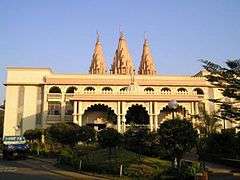Hinduism in Kenya
|
Part of a series on
 |
The influence of Hinduism in Kenya began in early 1st millennium AD when there was trade between East Africa and Indian subcontinent.[1] Archaeological evidence of small Hindu settlements have been found mainly in Zanzibar and coastal parts of Kenya, Swahili coast, Zimbabwe and Madagascar.[1] Many words in Swahili language have their etymological roots in Indian languages associated with Hinduism.[2]
Pew Research Center estimates there were 60,000 Hindus in Kenya in 2010, or less than 0.25% of the total Kenyan population.[3] Other estimates place the number higher. There were over 200,000 Hindus in Kenya (still less than 1% of total population, mostly[1] from Gujarat and northwestern states of India), before it gained independence from British colonial rule in 1963. During political conflicts that followed, many Hindus emigrated from Kenya to Europe (UK mainly) and other commonwealth nations.
Unlike north and northeast African countries which do not allow construction of Hindu temples or open practice of Hinduism, Kenya allows religious freedom to practice Hinduism; several of Kenyan cities have a number of Hindu temples from different schools of Hinduism.[4] The Hindu temples in Kenya are mostly of north and west Indian architectural style.
Demographics
According to the 2009 Census, there are a total of 53,393 Hindus in Kenya.[5]
Introduction
Hinduism in Kenya mainly comes from coastal trade routes between primarily between Gujarat and Marwar in India and East Africa.
The origin of the Kenyan Gujarati dates back to the late 1800s (early 1900s), when British colonialists brought laborers from India to build the Uganda–Kenya railway. Many of the laborers, rather than travel back to the Indian subcontinent, simply settled in Kenya, and slowly brought with them a host of hopefuls willing to start afresh.
Hindus in Kenya
One percent of Kenyan population practiced Hinduism as reported by IRF.[6] This is in contrast to 0.14% reported in the Kenyan Census of 2009. [7]
Today, the Gujarati community in Kenya is estimated at over sixty thousand, and is dispersed throughout the country. Despite varying degrees of acculturation, most have retained their strong Gujarati ties.
There are few hundred Kenyans converted to Hinduism mainly through Hare Krishnas.
Brahma Kumaris and Satya Sai Baba Organisation are also active in Kenya.
Hindu Temples in Kenya
- Shri Swaminarayan Mandir, Mombasa[8]
- Shri Swaminarayan Mandir, Nairobi (EASS)[8]
- Shri Swaminarayan Mandir, Nairobi (SKSS)[8]
- Shri Swaminarayan Mandir, Eldorethttp://www.shreeswaminarayanmandirbhuj.org/addressworld.html
- Shri Swaminarayan Mandir, Keruyoga[8]
- Shri Swaminarayan Mandir, Nakuru[8]
- Shri Swaminarayan Mandir, Kisumu[8]
- BAPS Shri Swaminarayan Mandir, Haile Selassie Rd., P.O. Box 81284, Mombasa, Kenya[9]
- BAPS Shri Swaminarayan Mandir, Forest Road, P. O. Box 40570, Nairobi, Kenyahttp://www.swaminarayan.org/globalnetwork/africa/nairobi.htm
- ISKCON Hare Krishna Temple - Nairobi
- ISKCON Hare Krishna Temple - Kisumu
- ISKCON Hare Krishna Temple - Mombasa
- BAPS Shri Swaminarayan Mandir, Masaai Avenue, P.O.Box 541, Nakuru
- BAPS Shri Swaminarayan Mandir, Tagore Road, P.O.Box 3643, Eldoret[10]
- BAPS Shri Swaminarayan Mandir, Okore Road, P.O.Box 164, Kisumu[11][12]
- Sri Kalyana Venkateswara Temple[13]
- Sri Ayyapa Seva Samaj/Sri Ayyapa Temple
Hindu Council of Kenya
Hindu Council of Kenya is an umbrella body of Hindus in Kenya. The Council is recognized by the Government. Until a few years back, the Hindus were described in the voter’s register as 'Non-Muslims'. Due to the efforts of the Council, they are now described as 'Hindus'. The Council has been busy in preparing syllabus and books for Hindu religious education.[14]
Hare Krishnas (ISKCON) in Kenya
Hare Krishnas has a good presence felt in Kenya. Krishna temples was first established in Nairobi and Mombasa in 1969. The same year, one of ISKCON’s most prominent devotees from Africa, HG Shakti Mati devi dasi, was initiated in Nairobi. Hare Krishnas has 3 Centres in Kisumu, Mombasa and Nairobi
References
- 1 2 3 Constance Jones and James D. Ryan, Encyclopedia of Hinduism, ISBN 978-0816073368, pp. 10-12
- ↑ A. Lodhi (2000), Oriental influences in Swahili: a study in language and culture contacts, ISBN 978-9173463775, pp. 72-84
- ↑ Table: Religious Composition by Country, in Numbers Pew Research Center (2012)
- ↑ Hindu temples - Members Hindu council of Kenya
- ↑ http://www.knbs.or.ke/Census%20Results/Presentation%20by%20Minister%20for%20Planning%20revised.pdf
- ↑ "Kenya".
- ↑ https://web.archive.org/web/20130115103229/http://www.knbs.or.ke/docs/PresentationbyMinisterforPlanningrevised.pdf
- 1 2 3 4 5 6 Mandir, Bhuj. "Shree Swaminarayan Temple Bhuj - BhujMandir.org".
- ↑ "Global Network of BAPS - Africa Mandir, Mombasa".
- ↑ "Global Network of BAPS - Africa Mandir, Eldoret".
- ↑ "List of Hindu Temples in Australia, Singapore and Africa".
- ↑ "Global Network of BAPS - Africa Mandir, Kisumu".
- ↑ "Welcome to sri kalyana venkateswara temple".
- ↑ http://www.vhp.org/englishsite/d.Dimensions_of_VHP/qVishwa%20Samanvya/vishvahinduparishadabroad.htm
External links
| Wikimedia Commons has media related to Hinduism in Kenya. |
- Hindu council of Kenya - A Kenyan Hindu community's social outreach resource
- Kenyan National Motto Controversial to Some
- The Hindu heritage of Kenya
- Sri Satya Sai Centre in Kenya
- Hare Krishna Centres in Kenya
- The History of ISKCON Kenya
- Brahma Kumaris has 6 Centres in Kenya
- Hinduism in SA & Africa
- Asians in Africa

